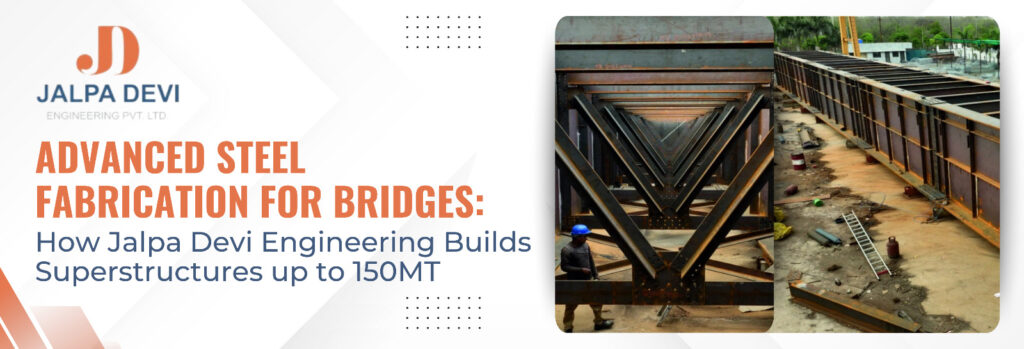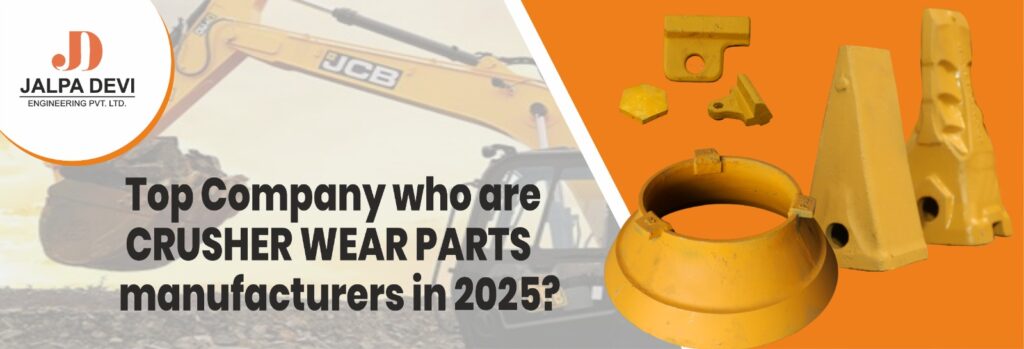India’s infrastructure revolution demands bridges that can withstand massive loads, extreme weather conditions, and decades of service. At the forefront of this engineering challenge stands Jalpa Devi Engineering Private Limited (JDEPL), a specialized manufacturer that has mastered the art of steel fabrication for bridges and superstructures capable of handling structures weighing up to 150MT. With their state-of-the-art facility in Pithampur, Madhya Pradesh, JDEPL represents the pinnacle of heavy fabrication excellence in India’s bridge construction industry.
The Engineering Marvel: Understanding Bridge Superstructures
Bridge superstructures form the backbone of any bridge project, comprising the deck, girders, trusses, and all structural elements that carry the live and dead loads. These critical components must demonstrate exceptional strength, durability, and precision engineering to ensure safe passage for vehicles, trains, and pedestrians. When dealing with superstructures weighing up to 150MT, the engineering complexity multiplies exponentially, requiring advanced manufacturing techniques and specialized expertise.
Steel fabrication for bridges involves transforming raw steel into precisely engineered components that can withstand tremendous forces while maintaining structural integrity over decades of service. The process demands not only technical expertise but also sophisticated manufacturing capabilities, quality control systems, and adherence to stringent international standards including IS, DIN, BS, ASTM, and JIS specifications.
Modern bridge construction faces unprecedented challenges in India’s diverse geographical and climatic conditions. From the monsoon-heavy regions of the western ghats to the seismic zones of the northeast, bridges must accommodate varying environmental stresses while supporting increasingly heavy traffic loads. This complexity necessitates advanced steel fabrication for bridges techniques that can produce robust, reliable superstructures capable of withstanding these diverse challenges.
JDEPL’s Manufacturing Excellence: A Comprehensive Approach
State-of-the-Art Infrastructure
Jalpa Devi Engineering’s manufacturing facility represents a significant investment in advanced fabrication technology. Spanning 61,000 square meters with 31,000 square meters of covered area, the facility boasts an impressive fabrication installed capacity of 12,000 MT per annum. This substantial capacity enables JDEPL to handle multiple large-scale bridge projects simultaneously while maintaining strict quality standards.
The company’s strategic location in Pithampur, positioned in the heart of Madhya Pradesh, provides optimal connectivity for raw material procurement and finished product delivery across India. This geographical advantage, combined with their ISO 9001:2018 certification, positions JDEPL as a reliable partner for complex bridge construction projects requiring heavy fabrication expertise.
The facility houses specialized equipment designed specifically for heavy fabrication operations, including heavy-duty cranes capable of handling 150MT components, precision cutting systems, and advanced welding stations equipped with the latest technology. This infrastructure investment demonstrates JDEPL’s commitment to delivering world-class steel fabrication for bridges services.
Advanced Fabrication Technologies
JDEPL employs cutting-edge fabrication techniques essential for heavy fabrication projects. Their manufacturing process incorporates multiple sophisticated technologies that ensure precision, efficiency, and quality:
Precision Cutting Systems: The facility utilizes advanced cutting technologies including plasma cutting, oxy-fuel cutting, and CNC-controlled systems to achieve precise dimensional accuracy. These methods ensure clean, smooth edges that require minimal finishing while maintaining the structural integrity of heavy steel components. For superstructures requiring complex geometries, waterjet cutting provides exceptional accuracy without introducing thermal stresses.
Computer Numerical Control (CNC) Programming: Advanced CNC systems control the movement of cutting, drilling, and milling tools along predetermined paths, significantly reducing human error and increasing fabrication efficiency. This technology is particularly crucial when manufacturing superstructures where precision tolerances are non-negotiable and where even minor deviations can compromise structural integrity.
Advanced Welding Capabilities: The company employs multiple welding processes including MIG (Metal Inert Gas), TIG (Tungsten Inert Gas), and submerged arc welding to address different project requirements. For heavy fabrication projects, specialized welding techniques such as electroslag welding (ESW) are utilized for joining thick steel plates, ensuring deep penetration and superior joint strength.
The Science Behind Heavy Steel Fabrication
Material Selection and Engineering
Creating bridge superstructures capable of handling 150MT loads begins with meticulous material selection. JDEPL utilizes high-grade structural steels including S355 and S275 grades, which offer optimal balance between strength, stiffness, and weldability. The selection process considers multiple critical factors:
- Load-bearing requirements: Comprehensive analysis of dead loads, live loads, wind loads, and dynamic forces including seismic considerations
- Environmental conditions: Detailed assessment of weather resistance, corrosion protection needs, and temperature variations
- Fatigue resistance: Ensuring long-term durability under cyclic loading conditions typical in bridge applications
- Weldability: Maintaining structural integrity during fabrication processes while minimizing heat-affected zones
The material engineering process also involves careful consideration of steel chemistry, including carbon content, alloying elements, and microstructural characteristics that affect final performance. For heavy fabrication applications, controlled cooling rates and specific heat treatment protocols ensure optimal mechanical properties throughout thick sections.
Advanced Manufacturing Processes
The fabrication of heavy fabrication components follows a systematic approach that ensures structural integrity and dimensional accuracy throughout the manufacturing cycle:
Design and Detailing: Engineers utilize advanced Building Information Modeling (BIM) software to create precise fabrication drawings and detect potential conflicts before manufacturing begins. This digital approach enables multidisciplinary collaboration, accurate quantity calculations, and virtual trial erections that identify assembly challenges before physical fabrication commences.
Cutting and Shaping: Heavy steel sections require specialized cutting techniques optimized for both efficiency and precision. JDEPL employs combination methods including saw cutting for efficiency and plasma cutting for precision. For complex geometries requiring exceptional accuracy, waterjet cutting provides clean cuts without thermal distortion, particularly important for superstructures with intricate connection details.
Bending and Forming: Large structural components often require specialized forming techniques to achieve design geometries. The company utilizes section bending, plate bending, and press braking operations to achieve required shapes while maintaining material properties. Heat-assisted forming techniques enable complex curvatures while preventing crack initiation in heavy sections.
Welding and Assembly: Critical joints undergo rigorous welding procedures using qualified welders operating under certified processes. Submerged arc welding proves particularly effective for thick sections common in heavy fabrication projects, providing deep penetration, high deposition rates, and excellent mechanical properties. Multi-pass welding techniques ensure complete fusion throughout thick sections while controlling heat input to minimize distortion.
Quality Assurance and Testing Protocols
Comprehensive Non-Destructive Testing (NDT)
JDEPL implements comprehensive quality control measures throughout the fabrication process, recognizing that heavy fabrication tolerates no compromise in structural integrity. Non-destructive testing methods including ultrasonic testing, radiographic examination, and magnetic particle inspection detect internal flaws without damaging components. These testing protocols are particularly crucial for superstructures where hidden defects could result in catastrophic failure.
Advanced ultrasonic testing techniques can detect internal discontinuities, porosity, and incomplete fusion in thick-section welds typical of heavy fabrication applications. Radiographic examination provides detailed images of weld internal structure, enabling detection of subtle defects that might compromise long-term performance.
Dimensional Accuracy and Geometric Control
Final geometry checks ensure conformance with fabrication tolerances, critical for proper field assembly of bridge superstructures. Advanced measuring equipment including laser scanning systems and coordinate measuring machines verify that manufactured components meet design specifications within acceptable limits. This precision is essential for heavy fabrication projects where assembly tolerances directly impact structural performance and construction schedules.
Three-dimensional scanning technology enables comprehensive geometric verification of complex superstructures, ensuring that camber, twist, and dimensional relationships conform to design requirements. This technology proves particularly valuable for steel fabrication for bridges where precise geometry is essential for proper load distribution and structural behavior.
Heat Treatment Processes
Specialized heat treatment facilities address residual stresses inherent in heavy fabrication processes. Pre-heating protocols and post-weld heat treatment minimize distortion while enhancing material properties throughout thick sections. Controlled cooling rates ensure optimal microstructural development, particularly important for superstructures subjected to dynamic loading conditions.
Stress relief heat treatment becomes particularly critical for heavy fabrication components where residual stresses from welding operations could affect long-term dimensional stability and fatigue performance. JDEPL’s specialized furnaces accommodate large components while maintaining precise temperature control throughout the treatment cycle.
Specialized Applications: Cable Stays, Suspension, and Extra-Dose Bridges
JDEPL’s expertise extends to manufacturing superstructures for specialized bridge types including cable-stayed, suspension, and extra-dose bridges. These applications present unique engineering and fabrication challenges that demand specialized knowledge and capabilities:
Cable-Stayed Bridges: Require precise anchor points and load distribution systems capable of handling concentrated cable forces. The fabrication process must accommodate complex geometry while ensuring that cable attachment points maintain precise alignment under all loading conditions. Heavy fabrication techniques enable the production of massive tower segments and deck units that form the backbone of these impressive structures.
Suspension Bridges: Demand exceptional strength-to-weight ratios and precise geometry for proper cable alignment. The manufacturing process must produce components with minimal weight while maintaining structural integrity under enormous tensile forces. Advanced steel fabrication for bridges techniques enable the production of tower segments and stiffening trusses that resist wind-induced oscillations while supporting substantial dead and live loads.
Extra-Dose Bridges: Combine cable-stayed and girder bridge principles, requiring versatile fabrication capabilities that address multiple structural systems within a single project. These hybrid structures demand superstructures that can accommodate both distributed loading from deck systems and concentrated forces from cable elements.
Each bridge type demands specific engineering solutions and fabrication techniques, showcasing JDEPL’s versatility in steel fabrication for bridges and their ability to adapt manufacturing processes to diverse structural requirements.
Environmental and Safety Considerations
Comprehensive Corrosion Protection
Bridge superstructures face continuous exposure to environmental elements that can significantly impact long-term performance. JDEPL implements comprehensive protection strategies including proper material selection, meticulous surface preparation, and advanced protective coating systems. Weathering steel options provide natural corrosion resistance for suitable applications, developing protective oxide layers that prevent further deterioration.
The company’s approach to corrosion protection incorporates multiple barriers including galvanizing, metallizing, and advanced polymer coatings. For heavy fabrication applications, special attention is paid to complex geometries and connection details where moisture accumulation could accelerate corrosion processes.
Rigorous Safety Protocols
Heavy fabrication operations inherently involve significant safety risks requiring comprehensive management systems. JDEPL maintains strict safety protocols including extensive training programs, regular equipment maintenance schedules, and detailed emergency response procedures. The handling of 150MT components requires specialized lifting equipment, qualified crane operators, and carefully planned rigging procedures that ensure worker safety throughout manufacturing and assembly operations.
Safety considerations extend beyond immediate manufacturing operations to include transportation, site delivery, and field erection procedures. JDEPL’s safety protocols address the complete lifecycle of superstructures from initial fabrication through final installation.
Future Innovations in Heavy Steel Fabrication
Automation and Robotics Integration
The future of steel fabrication for bridges increasingly incorporates automated systems and robotic welding technologies. These innovations enhance precision while reducing human exposure to hazardous operations. JDEPL continues investing in advanced manufacturing technologies including automated cutting systems, robotic welding cells, and intelligent material handling systems that maintain competitive advantages while improving working conditions.
Robotic welding systems prove particularly valuable for heavy fabrication applications where consistent weld quality and precise heat input control are essential. These systems can operate continuously while maintaining consistent welding parameters, resulting in superior mechanical properties and reduced distortion.
Sustainable Manufacturing Practices
Environmental consciousness drives innovation in heavy fabrication processes throughout the industry. Advanced techniques minimize material waste, reduce energy consumption, and promote recycling of steel components. These practices align with India’s commitment to sustainable infrastructure development while reducing manufacturing costs and environmental impact.
JDEPL’s sustainable practices include optimized cutting patterns that minimize waste, energy-efficient manufacturing processes, and comprehensive recycling programs that ensure minimal environmental impact throughout the manufacturing cycle.
Digital Integration and Industry 4.0
Building Information Modeling (BIM) and digital twin technologies revolutionize the fabrication process by enabling virtual trial erections and conflict detection before physical manufacturing begins. This digital approach reduces errors, optimizes fabrication sequences, and enables real-time monitoring of manufacturing.
Advanced data analytics provide insights into manufacturing efficiency, quality trends, and predictive maintenance requirements. These digital tools enable continuous improvement in steel fabrication for bridges while maintaining the precision required for heavy fabrication applications.
Project Management and Delivery Excellence
Integrated Project Approach
JDEPL’s approach to heavy fabrication projects integrates design, manufacturing, and delivery phases to ensure seamless project execution. Advanced project management systems coordinate material procurement, manufacturing schedules, and delivery logistics to meet demanding construction timelines while maintaining quality standards.
The company’s project management capabilities extend to coordination with bridge contractors, transportation specialists, and erection crews, ensuring that manufactured superstructures integrate smoothly with overall construction schedules.
Quality Documentation and Traceability
Comprehensive documentation systems track material certifications, manufacturing processes, and quality test results throughout the fabrication cycle. This traceability proves essential for heavy fabrication projects where regulatory compliance and long-term performance documentation are critical requirements.
Digital documentation systems enable real-time access to quality records, facilitating inspection processes and providing permanent records for future maintenance and service life assessment.
Conclusion: Engineering Excellence in Heavy Fabrication
Jalpa Devi Engineering Private Limited exemplifies the evolution of steel fabrication for bridges in India through their demonstrated capability to manufacture superstructures weighing up to 150MT. This achievement represents a significant milestone in heavy fabrication technology, demonstrating the company’s commitment to advancing India’s infrastructure capabilities.
Through advanced manufacturing processes, rigorous quality control systems, and continuous innovation, JDEPL contributes meaningfully to India’s infrastructure development goals while establishing new benchmarks for steel fabrication for bridges excellence. Their comprehensive approach—combining state-of-the-art facilities, skilled workforce, advanced technologies, and systematic quality management—positions them as a crucial partner in India’s bridge construction industry.
The company’s expertise in heavy fabrication and steel fabrication for bridges will remain instrumental in connecting communities and supporting economic development across the nation as infrastructure demands continue growing. Their commitment to excellence, demonstrated through ISO certification, successful project completions, and continuous technological advancement, establishes JDEPL as a trusted name in India’s engineering landscape.
As India’s infrastructure requirements evolve to accommodate increasing traffic loads, longer spans, and more complex geometric requirements, companies like Jalpa Devi Engineering that combine traditional engineering expertise with modern manufacturing capabilities will continue building the infrastructure foundations of tomorrow. Their mastery of heavy fabrication techniques and dedication to steel fabrication for bridge excellence ensures that India’s bridge construction industry has the technical capabilities required to meet future challenges while maintaining the highest standards of safety, quality, and performance.


